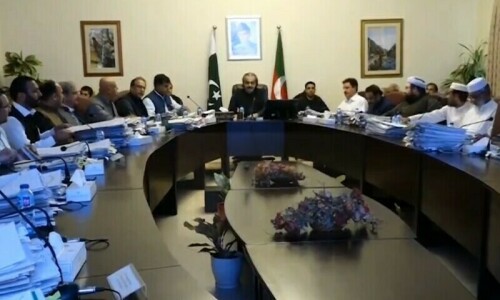PESHAWAR: Peshawar High Court on Tuesday directed the federal and Khyber Pakhtunkhwa governments to respond to a petition of Pashtun Tahaffuz Movement founder Manzoor Ahmad Pashteen and nine other leaders against a ban on their rights movement as well as restrictions on them.
A bench consisting of Chief Justice Ishtiaq Ibrahim and Justice Sahibzada Asadullah issued the order after preliminary hearing of the petition jointly filed by Manzoor Pashteen and nine others, requesting the court to declare illegal the proscription of PTM under Section 11B of the Anti-Terrorism Act and the petitioners under Section 11-EE.
The petitioners sought the court’s orders for the federal government to remove the PTM from the list of banned outfits in the First Schedule of ATA and their names from the ATA’s Fourth Schedule.
They also requested the court to declare that sections 11-B and 11-EE, amended through the Anti-Terrorism (Amendment) Act, 2014, are in conflict with Article 10-A of the Constitution that guarantees the right to fair trial and due process of law.
Leaders of rights movement insist restrictions are illegal
The petitioners sought orders for Section 11-D of the law, which deals with the keeping of an organisation under observation, to be read as a mandatory precursor to proscription under Section 11-B.
A panel of lawyers comprising Attaullah Kundi, Misbahul Mustafa, Jahanzeb Mehsud and Farhadullah Afridi appeared for the petitioners, whereas federal and KP governments were represented by additional attorney general Sanullah Khan and additional advocate general Inamullah Yousafzai, respectively.
The respondents in the petition include the federal government through the interior secretary, KP government through its chief secretary, KP inspector general of police, additional chief secretary (home and tribal affairs), and Peshawar chief capital city police officer.
Advocate Attaullah Kundi stated that PTM was a civil, non-violent social movement that had been advocating for the rights of Pakhtuns since its formation in 2014.
He added that unlike violent or militant movements in the region, the PTM had drawn inspiration from non-violence advocate Khan Abdul Ghaffar Khan and consistently stood against violence.
The lawyer said that the PTM recently organised the Pashtun National Jirga from Oct 11 to Oct 13 in Khyber tribal district to provide a platform to Pakhtuns to demand “justice and accountability.”
He contended that in the days leading up to the event, the federal government cracked down on the PTM and other organisers through security forces and local police and got tents set up for participants dismantled.
The counsel added that over a 100 PTM activists were arrested under Section 3 of the Maintenance of Public Order Ordinance.
He said that to the utter shock of his clients, the federal government issued the impugned notification on Oct 6to ban the PTM, while the petitioners and several other leaders of the organisation were “proscribed” under Section 11-EE with their names placed in Fourth Schedule of the ATA.
The lawyer argued that a 2014 amendment to the ATA empowered the government to ban an organisation on ex-parte basis without providing an opportunity of hearing to it, but that provision was unconstitutional and against the principle of natural justice.
Published in Dawn, November 13th, 2024













































Dear visitor, the comments section is undergoing an overhaul and will return soon.